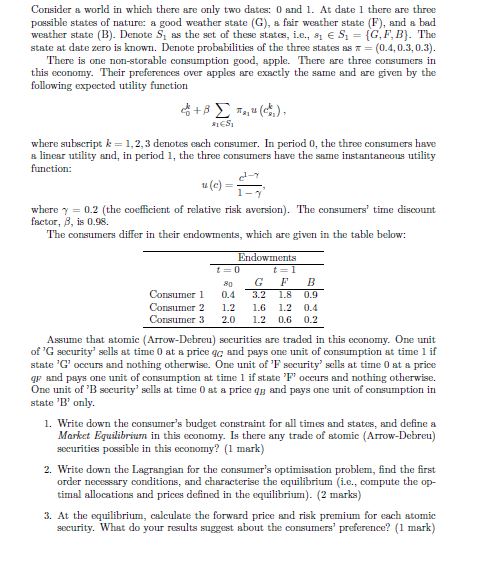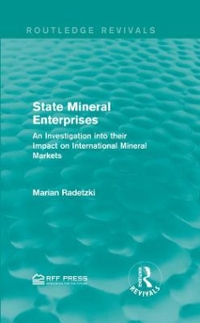Consider a world in which there are only two dates: 0 and 1. At date ] there are three possible states of nature: a good weather state (G), a fair weather state (F), and a bad weather state (B). Denote S, as the set of these states, i.c., a e S, = {G, F, B). The state at date zero is known. Denote probabilities of the three states as a = (0.4, 0.3, 0.3). There is one non-storable consumption good, apple. There are three consumers in this economy. Their preferences over apples are exactly the same and are given by the following expected utility function where subscript k = 1,2,3 denotes each consumer. In period 0, the three consumers have a linear utility and, in period 1, the three consumers have the same instantaneous utility function: u (c) = = where y = 0.2 (the coefficient of relative risk aversion). The consumers' time discount factor, 8, is 0.98. The consumers differ in their endowments, which are given in the table below: Endowments 1=0 t= 80 G F B Consumer 1 0.4 3.2 1.8 0.9 Consumer 2 1.2 1.G 1.2 0.4 Consumer 3 2.0 1.2 0.G 0.2 Assume that atomic (Arrow-Debreu) securities are traded in this economy. One unit of 'G security' sells at time 0 at a price ge and pays one unit of consumption at time 1 if state 'G' occurs and nothing otherwise. One unit of 'F security' sells at time 0 at a price gr and pays one unit of consumption at time 1 if state 'F" occurs and nothing otherwise. One unit of 'B security' sells at time 0 at a price on and pays one unit of consumption in state 'B' only. 1. Write down the consumer's budget constraint for all times and states, and define a Market Equilibrium in this economy. Is there any trade of atomic (Arrow-Debreu) securities possible in this economy? (1 mark) 2. Write down the Lagrangian for the consumer's optimisation problem, find the first order necessary conditions, and characterise the equilibrium (i.e., compute the op- timal allocations and prices defined in the equilibrium). (2 marks) 3. At the equilibrium, calculate the forward price and risk premium for each atomic security. What do your results suggest about the consumers' preference? (1 mark)







